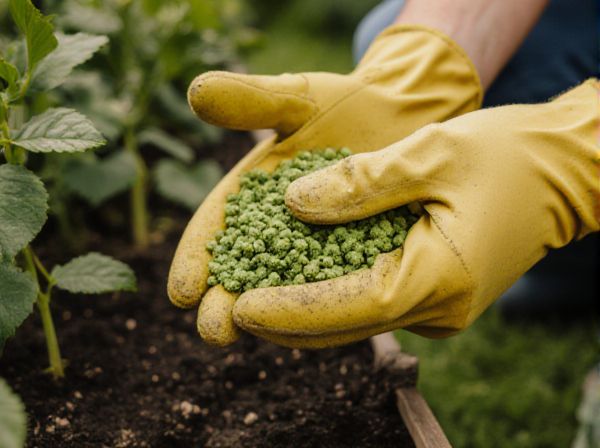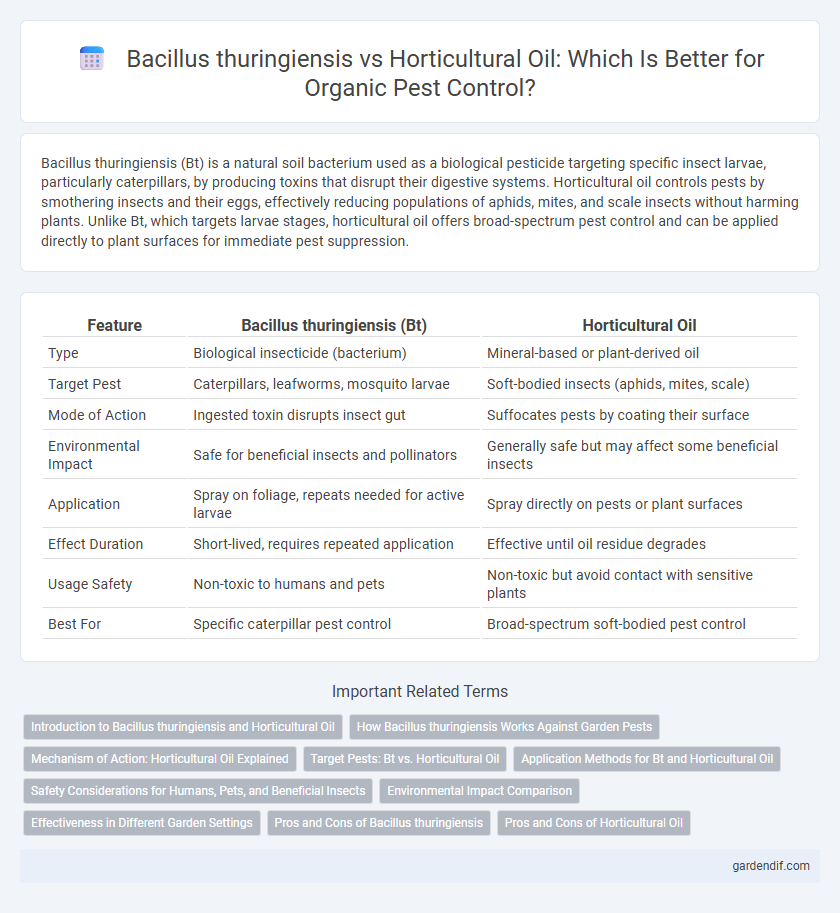
Bacillus thuringiensis vs horticultural oil Illustration
Bacillus thuringiensis (Bt) is a natural soil bacterium used as a biological pesticide targeting specific insect larvae, particularly caterpillars, by producing toxins that disrupt their digestive systems. Horticultural oil controls pests by smothering insects and their eggs, effectively reducing populations of aphids, mites, and scale insects without harming plants. Unlike Bt, which targets larvae stages, horticultural oil offers broad-spectrum pest control and can be applied directly to plant surfaces for immediate pest suppression.
Table of Comparison
| Feature | Bacillus thuringiensis (Bt) | Horticultural Oil |
|---|---|---|
| Type | Biological insecticide (bacterium) | Mineral-based or plant-derived oil |
| Target Pest | Caterpillars, leafworms, mosquito larvae | Soft-bodied insects (aphids, mites, scale) |
| Mode of Action | Ingested toxin disrupts insect gut | Suffocates pests by coating their surface |
| Environmental Impact | Safe for beneficial insects and pollinators | Generally safe but may affect some beneficial insects |
| Application | Spray on foliage, repeats needed for active larvae | Spray directly on pests or plant surfaces |
| Effect Duration | Short-lived, requires repeated application | Effective until oil residue degrades |
| Usage Safety | Non-toxic to humans and pets | Non-toxic but avoid contact with sensitive plants |
| Best For | Specific caterpillar pest control | Broad-spectrum soft-bodied pest control |
Introduction to Bacillus thuringiensis and Horticultural Oil
Bacillus thuringiensis (Bt) is a naturally occurring soil bacterium used as a biological pesticide targeting specific insect larvae by producing toxins that disrupt their digestive systems, making it highly effective against caterpillars, beetles, and mosquito larvae. Horticultural oil is a refined petroleum or vegetable oil applied as a contact insecticide and fungicide, suffocating pests such as aphids, scale insects, and mites by coating their bodies and eggs. Both Bt and horticultural oil offer environmentally friendly pest control options, with Bt providing targeted action against larvae and horticultural oil serving as a broad-spectrum treatment effective against a variety of soft-bodied insects.
How Bacillus thuringiensis Works Against Garden Pests
Bacillus thuringiensis (Bt) targets garden pests by producing proteins toxic to specific insect larvae when ingested, disrupting their digestive systems and causing mortality. Its mode of action is highly selective, affecting only caterpillars and certain larvae while sparing beneficial insects and pollinators. Unlike horticultural oil, which suffocates pests by coating them, Bt provides a biological control method that is both environmentally friendly and effective against pests like caterpillars and leaf miners.
Mechanism of Action: Horticultural Oil Explained
Horticultural oil controls pests by smothering insects and their eggs, disrupting their respiratory systems through a physical coating that blocks spiracles. Unlike Bacillus thuringiensis, a biological agent producing toxins targeting specific insect larvae, horticultural oil acts through a non-toxic, contact-based method effective against soft-bodied insects such as aphids, mites, and scale. This mode of action minimizes insect resistance risk and offers a broad-spectrum pest control option in integrated pest management programs.
Target Pests: Bt vs. Horticultural Oil
Bacillus thuringiensis (Bt) specifically targets caterpillars and larvae of moths and butterflies, making it highly effective against leaf-eating pests like cabbage worms, armyworms, and bollworms. Horticultural oil, composed of refined petroleum or plant-based oils, controls a broader range of pests including aphids, scale insects, mites, and whiteflies by smothering adults, eggs, and soft-bodied insects. While Bt acts selectively on larval stages through ingestion, horticultural oil provides direct contact control across multiple pest types and life stages, making them complementary tools in integrated pest management.
Application Methods for Bt and Horticultural Oil
Bacillus thuringiensis (Bt) is typically applied as a spray targeting actively feeding larvae on plant surfaces, requiring thorough coverage for maximum efficacy. Horticultural oil is also applied as a spray but emphasizes coating pests and plant surfaces to suffocate soft-bodied insects and eggs, often used as a dormant or summer oil application. Both methods demand precise timing and adherence to manufacturer guidelines to optimize pest control while minimizing plant damage.
Safety Considerations for Humans, Pets, and Beneficial Insects
Bacillus thuringiensis (Bt) is a microbial insecticide that specifically targets caterpillars and is considered safe for humans, pets, and beneficial insects due to its narrow mode of action. Horticultural oil works by suffocating insects and eggs, posing low toxicity risks but can potentially harm sensitive beneficial insects like pollinators if not applied carefully. Safety considerations prioritize correct application timing and methods to minimize non-target effects and ensure the protection of ecosystems.
Environmental Impact Comparison
Bacillus thuringiensis (Bt) is a bioinsecticide that targets specific pests with minimal impact on non-target organisms and soil health, making it highly environmentally friendly. Horticultural oils, while effective in suffocating pests, can sometimes harm beneficial insects and beneficial microbes if overused or applied improperly. Overall, Bt offers a more sustainable pest control solution due to its specificity and low toxicity in comparison to the broader ecological effects of horticultural oil.
Effectiveness in Different Garden Settings
Bacillus thuringiensis (Bt) is highly effective against caterpillar pests in vegetable gardens and organic fruit orchards due to its specificity and minimal impact on beneficial insects. Horticultural oil provides broad-spectrum control by smothering scale insects, aphids, and mites, making it suitable for ornamental plants and mixed-species gardens. Effectiveness depends on target pest and plant type; Bt excels in managing larval pests, while horticultural oil offers versatile protection across diverse garden environments.
Pros and Cons of Bacillus thuringiensis
Bacillus thuringiensis (Bt) is a biological insecticide effective against caterpillars and larvae, offering targeted pest control while being safe for beneficial insects and humans. It decomposes naturally, minimizing environmental impact and resistance development, but requires precise timing of application for optimal results. However, Bt is less effective against adult pests and can be washed away by rain, necessitating frequent treatments in humid or wet conditions.
Pros and Cons of Horticultural Oil
Horticultural oil effectively controls soft-bodied pests like aphids and mites by suffocating them without harming beneficial insects, making it an eco-friendly option for pest management. Its limitations include potential phytotoxicity if applied during high temperatures or on sensitive plants, and reduced efficacy in heavy infestations compared to Bacillus thuringiensis, which targets specific insect larvae via ingestion. Regular applications of horticultural oil require careful timing and coverage to maximize pest control while minimizing plant stress and environmental impact.
Bacillus thuringiensis vs horticultural oil Infographic

 gardendif.com
gardendif.com